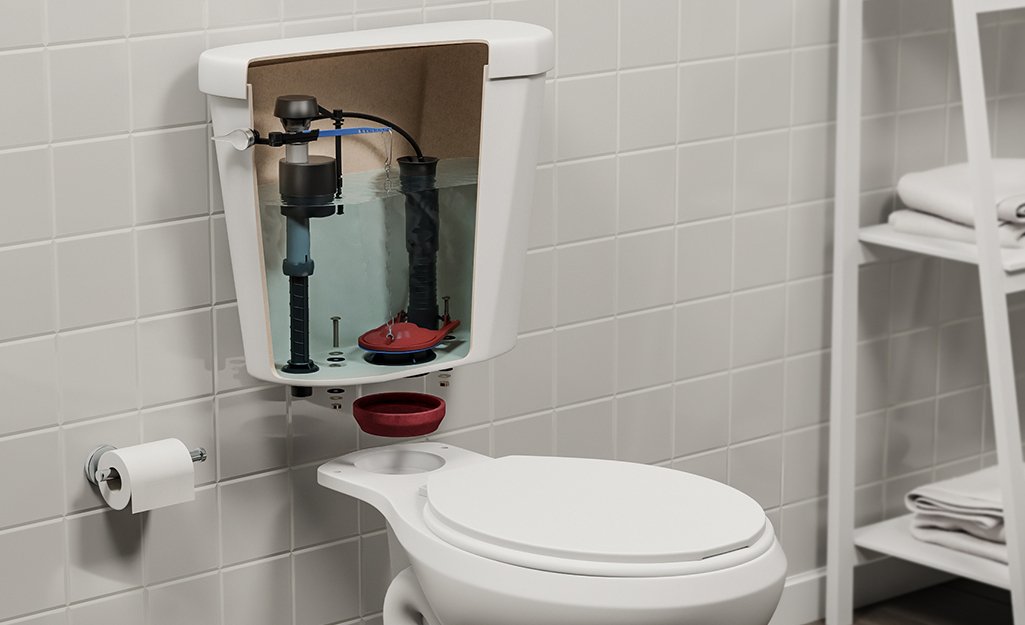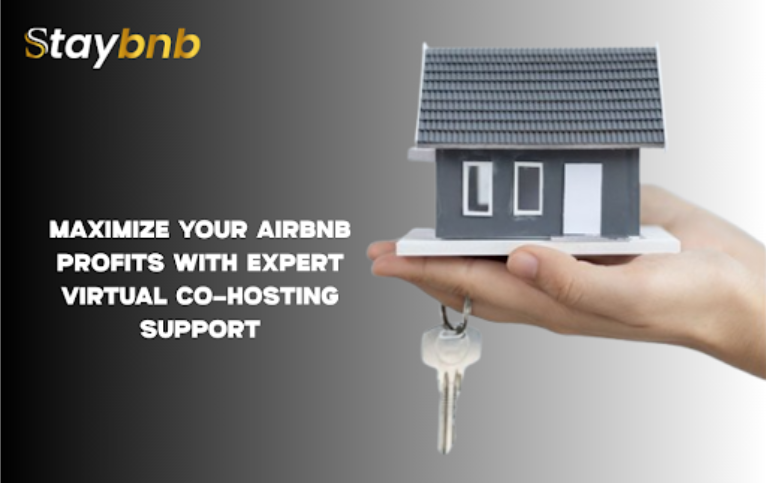The short-term rental market is booming. From cozy beachfront bungalows to chic city apartments, opportunities abound for savvy owners and investors. But with increasing competition, how do you ensure your property stands out and attracts the right guests? The answer, in large part, lies in the power of keywords.
Think of keywords as the digital breadcrumbs potential guests leave behind when searching for their perfect getaway. By strategically incorporating these terms into your listing titles, descriptions, and website content, you significantly increase your visibility on popular booking platforms and search engines. This means more eyes on your property, higher occupancy rates, and ultimately, a stronger return on your investment.
This blog post, brought to you by the experts at Staybnb, will equip you with 10 easy yet effective strategies to uncover the winning keywords that will drive traffic to your vacation rental.
Why Keyword Research Matters for Short-Term Rentals
Before we dive into the “how,” let’s briefly touch upon the “why.” In today’s digital age, most travel planning begins online. Potential guests use specific words and phrases to find accommodations that meet their needs – whether it’s a “pet-friendly cabin near hiking trails” or a “luxury apartment with a city view.”
According to recent industry reports, over 70% of online travel bookings start with a search engine query. This highlights the critical importance of understanding and utilizing relevant keywords. Properties that effectively target these search terms are far more likely to appear in search results, capturing the attention of ready-to-book travelers.
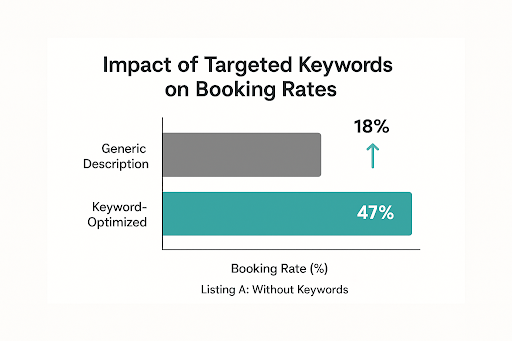
Staybnb understands the intricacies of the short-term rental market, and we know that mastering keyword research can be a game-changer. Let’s explore ten actionable ways you can start finding those high-impact keywords today.
1. Brainstorm Like a Guest:
Put yourself in the shoes of your ideal guest. What would you type into Google or Airbnb to find a property like yours? Consider:
- Location: City, neighborhood, landmark (e.g., “downtown Traverse City apartment,” “Corktown historic home,” “property near Mackinac Bridge”)
- Property Type: House, apartment, condo, villa, cabin, studio
- Amenities: Specific features that make your property appealing (e.g., “pet-friendly,” “with lake access,” “hot tub,” “balcony,” “private dock,” “free Wi-Fi,” “fully equipped kitchen”)
- Guest Type: Who is your property best suited for? (e.g., “family vacation rental,” “romantic Up North cabin,” “Ann Arbor business accommodation,” “group ski trip lodging”)
- Activities & Attractions: What brings people to your area? (e.g., “near Sleeping Bear Dunes,” “close to breweries in Grand Rapids,” “hiking trails nearby,” “Detroit sporting event lodging”)
Tip: Create a list of all the possible terms and phrases that come to mind. Don’t filter yourself at this stage; the more ideas, the better!
2. Analyze Your Competition:
Take a look at successful short-term rental listings in your area. What keywords are they using in their titles and descriptions? What terms appear frequently in guest reviews? This can provide valuable insights into what resonates with travelers searching for properties like yours.
Important Note: Don’t just copy your competitors. Use their strategies as inspiration to identify potentially relevant keywords and then find ways to differentiate your listing.
3. Leverage Booking Platform Search Suggestions:
Many popular booking platforms, like Airbnb and Booking.com, offer search suggestions as users type in their queries. This feature can reveal popular and relevant keywords that people are actively using to search for accommodation in your area.
Actionable Step: Start typing in basic terms related to your property and location on these platforms and see what suggestions appear. These are often high-volume keywords worth considering.
4. Explore Google Keyword Planner (Free Tool):
Google Keyword Planner is a powerful, free tool designed for advertisers, but it’s also incredibly useful for anyone looking to understand search volume and keyword trends.
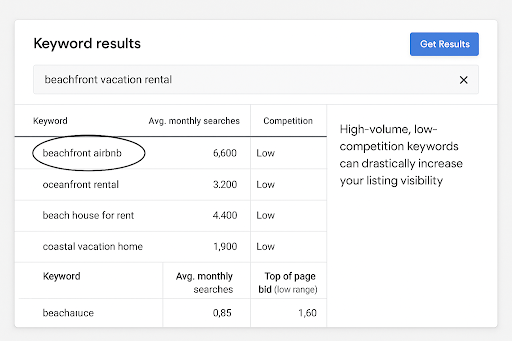
How to use it: Simply enter keywords related to your vacation rental, and the tool will provide data on:
- Search Volume: How often people search for that specific keyword.
- Competition: How many advertisers are bidding on that keyword (this can indicate its popularity).
- Related Keywords: Discover other relevant terms you might not have considered.
5. Tap into Long-Tail Keywords:
Long-tail keywords are longer, more specific phrases that typically have lower search volume but higher intent. For example, instead of “Detroit apartment,” a long-tail keyword might be “luxury 2 bedroom apartment in Downtown Detroit with city views.”Why are they important? Long-tail keywords often attract highly qualified leads – people who know exactly what they are looking for. While they might not generate as much overall traffic, the traffic they do attract is more likely to convert into bookings.
6. Utilize Social Media Listening:
Pay attention to conversations happening on social media platforms related to travel in your area. What questions are people asking? What destinations and types of accommodations are they discussing? This can uncover emerging trends and niche keywords.
Tip: Search for hash tags related to your location and the type of experience your property offers.
7. Mine Your Guest Reviews:
Your past guests are a goldmine of keyword information! Read through your reviews and look for recurring words and phrases they use to describe your property, its location, and their overall experience. These are natural, authentic keywords that resonate with travelers.
8. Consider Location-Specific Keywords:
Think beyond just the city name. Include nearby landmarks, attractions, popular neighborhoods, and even transportation hubs in your keyword research. For example, if your property is near a famous park, using keywords like “[Park Name] vacation rental” can attract visitors specifically looking to be close to that attraction.
9. Think About Seasonal Keywords:
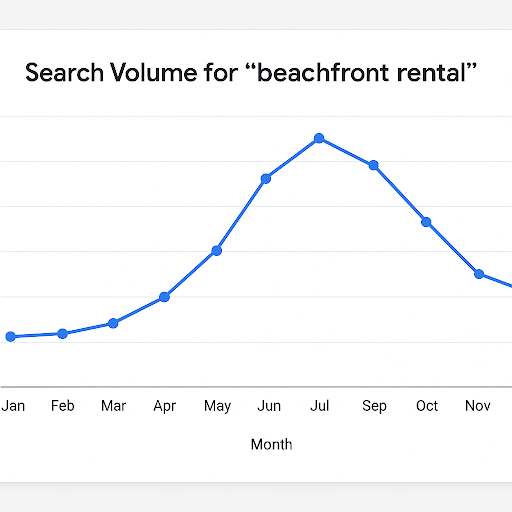
Depending on your location and the attractions nearby, certain times of the year might be more popular for specific activities. Incorporate seasonal keywords into your strategy. For example, if your property is near ski slopes, use terms like “winter ski chalet” during the colder months.
10. Use Keyword Research Tools (Paid Options):
While free tools like Google Keyword Planner are excellent starting points, several paid keyword research tools offer more advanced features and data analysis. These tools can provide deeper insights into keyword competition, search trends, and even competitor keyword strategies. Some popular options include SEMrush, Ahrefs, and Moz Keyword Explorer.
Implementing Your Keywords for Success
Once you’ve compiled a list of relevant keywords, the next step is to strategically incorporate them into your:
- Listing Titles: Use your most important and descriptive keywords here.
- Property Descriptions: Weave keywords naturally throughout your descriptions, highlighting key features and benefits.
- Website Content: Optimize your website pages and blog posts with relevant keywords.
- Meta Descriptions: These short snippets appear in search engine results and should include compelling keywords to encourage clicks.
Staybnb: Your Partner in Short-Term Rental Success
Finding the right keywords is just one piece of the puzzle when it comes to maximizing your short-term rental income. Staybnb offers comprehensive property management services designed to handle everything from listing optimization and dynamic pricing to guest communication and cleaning.
Ready to take your vacation rental to the next level? Contact Staybnb today for a free consultation and discover how our expert team can help you attract more bookings and achieve your financial goals.
Read More: Fair Housing Laws for Short-Term Rentals

